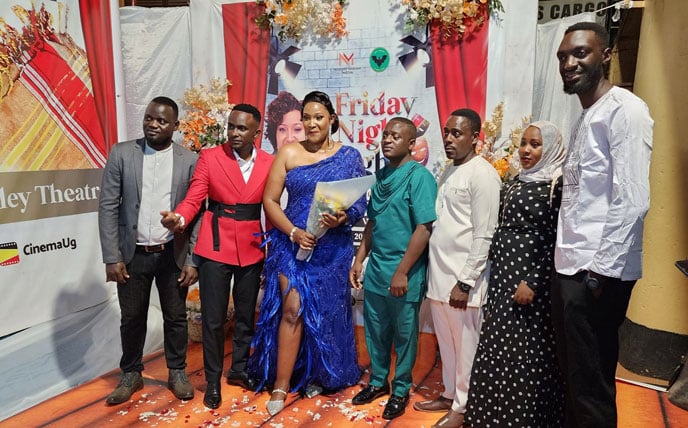Unpacking Ndagire’s Friday Night Lights

Veronica Nakayo (third left) with some of the revellers at her Friday Night Lights. Photo | Mariam Ndagire media.
What you need to know:
- One of the events, the Kampala Performing and Theatre Festival, was organised by Mariam Ndagire’s Mariam Ndagire Media, while the Kampala International Theatre Festival was organised by Tebere Arts Foundation.
If there is one conversation we have heard over the years, it is about theatre in limbo.
In fact, the topic dominated the conversation at last year’s two theatre festivals in Kampala. The events that took place back to back at Bat Valley Theatre and Ndere Centre.
One of the events, the Kampala Performing and Theatre Festival, was organised by Mariam Ndagire’s Mariam Ndagire Media, while the Kampala International Theatre Festival was organised by Tebere Arts Foundation.
The two theatre events may have had the same objective: improve theatre, adopt new media, and find progressive ways to win a new audience while keeping the one that seems to be dwindling. Big on the panels’ agenda was getting theatre out of limbo, a topic that had a panel of Abbey Mukiibi, Mariam Ndagire, Andrew Ssebaggala, and Aganza Sanyu Kisaka, among others.
There were many issues presented in the discussion about theatre and its position in Uganda, plus the elements that have driven people away over the years. One of such was the fact that theatres failed to adapt to the changing times, not changing their winning formulas.
For instance, Bat Valley Theatre was the home of Afri-Talent which drew a lot on the popular faces of Abbey Mukiibi, Ruth Kalibbala, Mariam Ndagire, and John Segawa, among others. When alternative forms of entertainment, such as music, started digging into their star base, utilising them as actors in music videos and later inviting them to reprise the roles on stage. Theatre was losing ground without noticing it.
Then, there was the Kampala International Theatre (KITF); unlike the Theatre and Performing Arts Festival, which was hosting a second edition, this was celebrating a 10th milestone.
Held in three venues—the National Theatre, Motiv, and Ndere Centre—all in Kampala, this year’s edition of the festival was still addressing some of the issues that were heavily discussed by the one at Bat Valley.
In an interview with The African Theatre Magazine early this year, Mariam Ndagire noted that theatre lost it because the thespians made money and started forgetting the core of their success, the art. By 2000, theatre makers and actors had sprung from celebrities to bona fide superstars.
Kadongo kamu music, which was popular at the time, would often tap into theatre by plotting skits around their performances; thus, it became common to find Paulo Kafeero teaming up with Bakayimbira Dramactors for a concert.
Soon weddings showed up, and the likes of Ndagire started performing at kwanjula (introduction ceremonies), and others became MCs.
“It ate us slowly, and we could not notice; people splashed money in our faces, and we wanted money. Then we became reluctant to create; we started picking situations and lines from our plays and putting them on the radio; it killed the appetite of those that used to pay to see us on weekends,” she says.
Today, Ndagire is one of the forces trying to save theatre through various initiatives, such as the festival. Last year, she says they noticed that they had not trained a new generation to take the craft forward.
This gave birth to the Friday Night Lights The initiative is meant to spotlight a young thespian. The person being highlighted puts together a production, hires actors, writes, and at times directs. The main role is to see them put on a successful production.
“We give them a budget and can advise them, but their role is to put this show on and invite their fans to see it,” she says.
The main aim of the nights is to introduce a new group to all the hoops of theatre, including presentations, but not limited to them.
In the past, Friday Night Lights shows have been held for actors such as Sanyu TV series actress Faridah Nabagereka, Stephania, Veronica Nakayo, Angella Angel Nakanwagi, and Hadi and Faisal on Friday.
The actors for these spotlights put on their own productions, which they oversee themselves. They produce and do the dirty work of marketing and directing.
Ndagire says this is meant to introduce these actors to the other departments of production; hopefully, they will later be able to take on serious production. The monthly showcase has been a major success, with some of them selling out.




